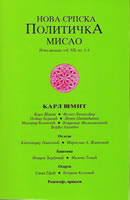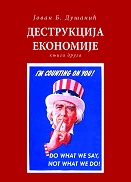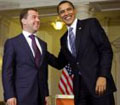| NSPM in English | |||
Turning Russia into a Euro-Atlantic Stakeholder |
 |
 |
 |
| субота, 12. јун 2010. | |
|
(New Atlanticist, June 8, 2010)
Can we turn Moscow into a stakeholder in the architecture of the Euro-Atlantic world without simultaneously frightening allies in "New Europe" that they will be abandoned? Can we do the "tap dance", backing off, for instance, on the extension of Euro-Atlantic institutions into the Eurasian space in return for obtaining greater Russian cooperation on a series of issues that, over time, would see Russia voluntarily aligning more with the West? (Thankfully, the voluntary choice of the current Ukrainian government to abandon aspirations for NATO membership ensures that there will be "breathing room" between Russia and the West, in terms of security.) Listening to the discussion, I was reminded of the early post-Cold War discussions about bringing Russia into the Atlantic Alliance. If Kupchan refers to his recent Foreign Affairs article proposing Russian membership in NATO as an idea whose time has not yet come, what to see then of Coral Bell's similar proposal, advanced in the Winter 1990/91 issue of The National Interest? Or former undersecretary of defense Fred Ikle's proposal, two decades ago, for a "Russian-American defense community"? Earlier this morning (also at the CSF) Mary Elise Sarotte noted that the "ordering moment" of 1989-90 did not resolve the issue Russia's role in European security, and this remains one of the lingering unanswered questions. Post-Soviet Russia wanted to invent a completely new European security architecture, whereas the United States has, for the most part, perpetuated Cold War institutions and attempted, with mixed success, to renovate them for 21st century conditions. If we are now in a better position to begin resolving Russia's final status — and the Obama administration has recently unveiled a new grand agenda — what are the lessons we can draw from Kupchan's work, explored in great detail in his new book How Enemies Becomes Friends? Two come to mind. The first is to understand the proper sequencing of how partnerships develop. It is rare for economic integration to precede a political rapprochement (China may be an important exception). The growth in the Russian-American business relationship has not been sufficient to provide the necessary ballast for the political relationship. The diplomats and military officers have to "get the geopolitics right" in order for economic and political ties to have the breathing room to grow and take root. The second is to be aware of the domestic impediments to engagement. Does an outreach to a former adversary and to a state that in then-Senator Obama's words is currently neither friend nor foe generate opposition that prevents the "mutual exchange of compromises" that builds consensus? Two interesting tests (from the U.S. side) are whether the Senate ratifies the START treaty and the Congress permits a 123 civil nuclear agreement with Russia even in the absence of real progress toward settling the Russian-Georgian conflict, which is what torpedoed the 2008 effort to secure that agreement. From the Russian side, will Moscow abide by its promise to endorse a new sanctions resolution against Iran, despite the trilateral meeting between Vladimir Putin, Mahmoud Ahmadinejad, and Recep Tayyip Erdogan? Is giving the United States — and the Obama administration in particular — a major foreign policy success an important incentive for the Kremlin to cooperate? We might be standing on the threshold of a major shift in U.S.-Russia relations. Or these overtures might be insufficient to change the dynamic of a relationship no longer characterized by overt hostility but unable to forge a closer ties. Nikolas K. Gvosdev, an Atlantic Council contributing editor, is on the faculty of the U.S. Naval War College. The views expressed are his own and do not reflect those of the Navy or the U.S. government. http://www.acus.org/new_atlanticist/turning-russia-euro-atlantic-stakeholder |
Од истог аутора
- Russia’s Foreign Policy: What’s Next?
- Engaging the Southern Democracies
- Shaping the Multipolar World
- The Realist Prism: The Ukraine That Might Have Been
- What the United States Can Learn From the Soviet War in Afghanistan
- The Realist Prism: Horse Trading with Beijing
- Resetting Russia
- Facing the Facts on Terror
- Reagan Plagiarized
- Moving NATO Forward
Остали чланци у рубрици
- Playing With Fire in Ukraine
- Kosovo as a res extra commercium and the alchemy of colonization
- The Balkans XX years after NATO aggression: the case of the Republic of Srpska – past, present and future
- Из архиве - Remarks Before the Foreign Affairs Committee of the European Parliament
- Dysfunction in the Balkans - Can the Post-Yugoslav Settlement Survive?
- Serbia’s latest would-be savior is a modernizer, a strongman - or both
- Why the Ukraine Crisis Is the West’s Fault
- The Ghosts of World War I Circle over Ukraine
- Nato's action plan in Ukraine is right out of Dr Strangelove
- Why Yanukovych Said No to Europe

.jpg)








 At the Naval War College's
At the Naval War College's












